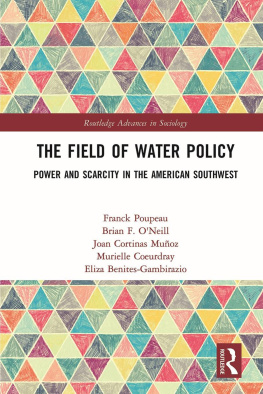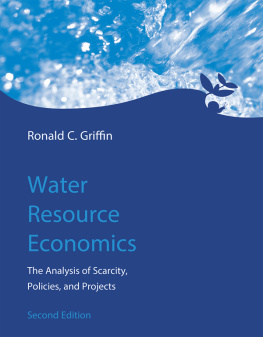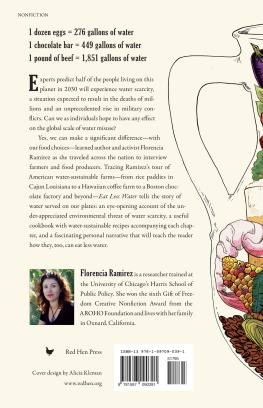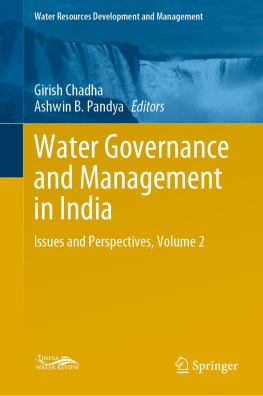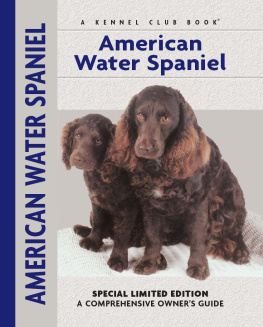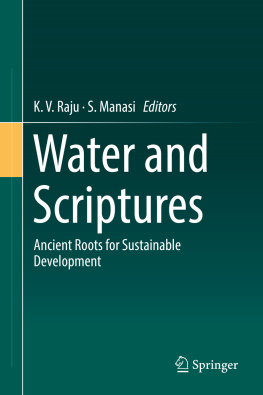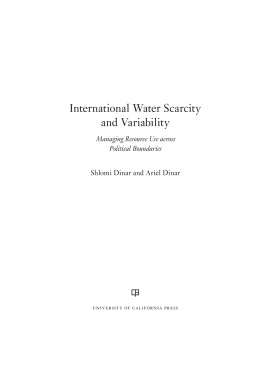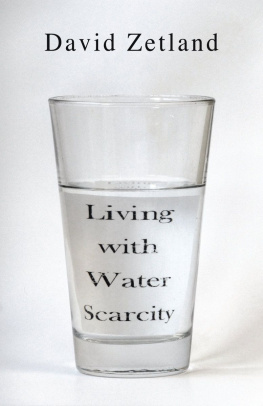The Field of Water Policy
Bringing together the analysis of a diverse team of social scientists, this book proposes a new approach to environmental problems. Cutting through the fragmented perspectives on water crises, it seeks to shift the analytic perspectives on water policy by looking at the social logics behind environmental issues. Most importantly, it analyzes the dynamic influences on water management, as well as the social and institutional forces that orient water and conservation policies. The first work of its kind, The Field of Water Policy: Power and Scarcity in the American Southwest brings the tools of Pierre Bourdieus field sociology to bear on a moment of environmental crisis, with a study of the logics of water policy in the American Southwest, a region that allows us to see the contest over the management of scarce resources in a context of lasting drought. As such, it will appeal to scholars in the social and political sciences with interests in the environment and the management of natural resources.
Franck Poupeau is Director of Research at the French National Center for Scientific Research (CNRS) and he has been the co-director of the joint international unit for Interdisciplinary and Global Environmental Studies (UMI iGLOBES, CNRS/University of Arizona) from 2012 to 2017. He is the co-editor of several books on water policy: Water Bankruptcy in the Land of Plenty (2016), Water Regimes: Beyond the Public and Private Sector Debate (2016), Water Conflicts and Hydrocracy in the Americas: Coalitions, Networks, Policies (2018).
Brian F. ONeill is a doctoral candidate in the Department of Sociology at the University of Illinois at Urbana-Champaign, USA, and at the Center for Research and Documentation on the Americas (CREDA, CNRS/Universit Paris III La Sorbonne Nouvelle).
Joan Cortinas Muoz is a postdoctoral researcher at the Centre de Sociologie des Organisations, Sciences Po Paris, France. Previously, he worked at the UMI iGLOBES, CNRS/University of Arizona.
Murielle Coeurdray is a postdoctoral researcher at the UMI iGLOBES, CNRS/University of Arizona.
Eliza Benites-Gambirazio is a post-doctoral researcher at the CNRS (French National Center for Scientific Research). She is affiliated with the Centre Max Weber (University Lyon 2).
Routledge Advances in Sociology
21 Globalization, Uncertainty and Late Careers in Society
Edited by Hans-Peter Blossfeld, Sandra Buchholz, and Dirk Hofcker
22 Bourdieus Politics
Problems and Possibilities
Jeremy F. Lane
23 Media Bias in Reporting Social Research?
The Case of Reviewing Ethnic Inequalities in Education
Martyn Hammersley
24 A General Theory of Emotions and Social Life
Warren D. TenHouten
25 Sociology, Religion and Grace
Arpad Szakolczai
26 Youth Cultures
Scenes, Subcultures and Tribes
Edited by Paul Hodkinson and Wolfgang Deicke
27 The Obituary as Collective Memory
Bridget Fowler
28 Tocquevilles Virus
Utopia and Dystopia in Western Social and Political Thought
Mark Featherstone
29 Jewish Eating and Identity Through the Ages
David Kraemer
30 The Institutionalization of Social Welfare
A Study of Medicalizing Management
Mikael Holmqvist
For more information about this series, please visit: www.routledge.com/Routledge-Advances-in-Sociology/book-series/SE0511
The Field of Water Policy
Power and Scarcity in the American Southwest
Franck Poupeau
Brian F. ONeill
Joan Cortinas Muoz
Murielle Coeurdray
Eliza Benites-Gambirazio
First published 2020
by Routledge
2 Park Square, Milton Park, Abingdon, Oxon OX14 4RN
and by Routledge
52 Vanderbilt Avenue, New York, NY 10017
Routledge is an imprint of the Taylor & Francis Group, an informa business
2020 Franck Poupeau, Brian F. ONeill, Joan Cortinas Muoz, Murielle Coeurdray and Eliza Benites-Gambirazio
The right of Franck Poupeau Brian F. ONeill, Joan Cortinas Muoz, Murielle Coeurdray, and Eliza Benites-Gambirazio to be identified as authors of this work has been asserted by them in accordance with sections 77 and 78 of the Copyright, Designs and Patents Act 1988.
All rights reserved. No part of this book may be reprinted or reproduced or utilized in any form or by any electronic, mechanical, or other means, now known or hereafter invented, including photocopying and recording, or in any information storage or retrieval system, without permission in writing from the publishers.
Trademark notice : Product or corporate names may be trademarks or registered trademarks, and are used only for identification and explanation without intent to infringe.
British Library Cataloguing-in-Publication Data
A catalogue record for this book is available from the British Library
Library of Congress Cataloging-in-Publication Data
A catalog record has been requested for this book
ISBN: 978-0-367-19259-4 (hbk)
ISBN: 978-0-429-20139-4 (ebk)
Typeset in Times New Roman
by Deanta Global Publishing Services, Chennai, India
Contents
This collective survey of the protagonists of Southwestern American water policy has been realized thanks to the support of the joint international unit iGLOBES (National Center for Scientific Research (CNRS)/University of Arizona). Colette Doressoundiram has been a fantastic administrator throughout the project, allowing the units members the full time they needed to dedicate themselves to research activities.
Many other collaborators have helped us during the many years leading to the completion of the project. First among them are Ed Curley, with his vast knowledge of environmental issues in the American West, and Evan Canfield, who took us to where it all started where the Santa Cruz River flowed again
Many other people have encouraged the unit iGLOBES activities or participated in them: Rebecca Bernat, Anne-Lise Boyer, Leandro Del Moral, Pierre Deymier, Regis Ferrire, Claude Le Gouill, Franois-Michel Le Tourneau, Pierre Lucas, Pierre Meystre, Lala Razafimahefa, Eduardo Rios, Marie-Blanche Roudault, Joaquin Ruiz, Claire Zucker, Rositsa Yaneva. At the INSHS (CNRS), Patrice Bourdelais and Pascal Marty have also strongly supported the unit. At the Udall Center, Chris Scott and Robert Varady have always collaborated positively.
This research has been supported by the ANR BLUEGRASS, the OHMI Pima County, which is part of the Labex DRIIHM (ANR-11-LABX-0010), by the UMI iGLOBES (UMR 3157 CNRS/University of Arizona), and by the CREDA (UMR 7227 CNRS/Paris III).
Any possible errors, or misunderstandings in this book, remain the sole responsibility of the authors, however.
You have to hear the water flow in the bed of the Santa Cruz River near Tucson, Arizona, to realize that something is happening in the field of water policy in the American West. After being exploited for decades for sanitation and drinking water, agriculture, surface and subterranean mining, and urban development, the water course that the historian and legal scholar, Robert Glennon, described, oxymoronically, as the dry river (2002: 36), is now benefiting from the work carried out by Pima County, near the Mexican border, to restore ecosystems and conserve water resources. In a state as politically conservative and as focused on development, both economic and in terms of real estate, as Arizona, the emergence of green approaches to water policy may be surprising. In a sense, then, this book is an attempt to explain such a paradox: how can a process of ecologization (Poupeau et al. 2018) be generated in adverse conditions corresponding to a king of a worst-case scenario.

